湘教版英语八年级上册初二英语知识点
- 格式:docx
- 大小:31.57 KB
- 文档页数:21

新人教版八年级上册英语单元语法及知识点归纳Unit1 Where did you go on vacation?【重点语法】不定代词:不指名代替任何特定名词或形容词的代词叫做不定代词。
用法注意:1. some 和any + 可数名/ 不可数名。
some 多用于肯定句,any 多用于否定句、疑问句和条件从句。
有些问句中用some, 不用any, 问话者希望得到对方肯定回答。
2. 由some, any, no, every 与body, one, thing 构成的复合不定代词作主语时,其谓语动词用三单。
3. 不定代词若有定语修饰,该定语要置于其后:如:something interesting 【重点短语】1. buy sth for ab./ buy sb. sth 为某人买某物2. taste + adj. 尝起来3. nothing...but + V.( 原形) 除了之外什么都没有4. seem + (to be) + adj 看起来5. arrive in + 大地方/ arrive at + 小地方到达某地6. decide to do sth. 决定做某事7. try doing sth. 尝试做某事/ try to do sth. 尽力做某事8. enjoy doing sth. 喜欢做某事9. want to do sth. 想去做某事10. start doing sth. 开始做某事=begin doing sth.11. stop doing sth. 停止做某事区分:stop to do sth. 停下来去做某事12. dislike doing sth. 不喜欢做某事14. so + adj + that + 从句如此以至于16. tell sb. (not) to do sth. 告诉某人(不要)做某事17. keep doing sth. 继续做某事18. forget to do sth. 忘记去做某事/ forget doing sth 忘记做过某事【词语辨析】1. take a photo/ take photos 拍照quite a few+ 名词复数“许多”2. seem + 形容词看起来... You seem happy today.seem + to do sth. 似乎/ 好像做某事I seem to have a coldIt seems + 从句似乎.. . It seems that no one believe you.seem like ... 好像,似乎.. It seems like a good idea.3. arrive in + 大地点= get to= reach+ 地点名“到达...... ”arrive at + 小地点(注:若后跟地点副词here/there/home, 介词需省略,如:arrive here; get home )4. feel like sth 感觉像feel doing sth. 想要做某事5. wonder (想知道)+ 疑问词(who, what, why) 引导的从句。
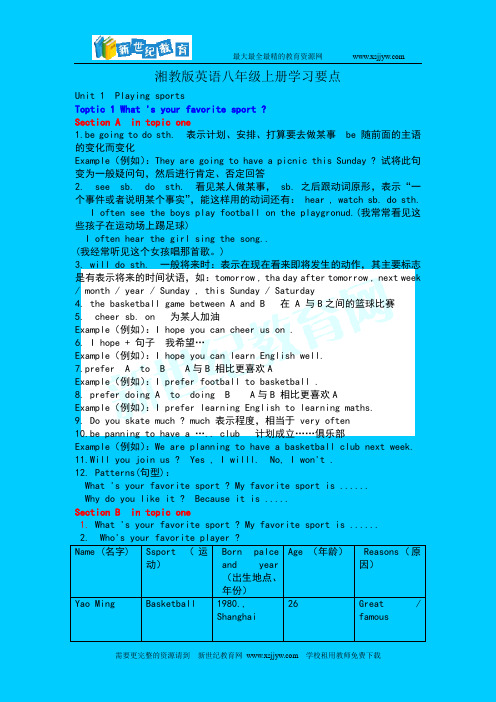
湘教版英语八年级上册学习要点Unit 1 Playing sportsToptic 1 What 's your favorite sport ?Section A in topic one1.be going to do sth. 表示计划、安排、打算要去做某事 be 随前面的主语的变化而变化Example(例如):They are going to have a picnic this Sunday ? 试将此句变为一般疑问句,然后进行肯定、否定回答2. see sb. do sth. 看见某人做某事, sb. 之后跟动词原形,表示“一个事件或者说明某个事实”,能这样用的动词还有: hear , watch sb. do sth.I often see the boys play football on the playgronud.(我常常看见这些孩子在运动场上踢足球)I often hear the girl sing the song..(我经常听见这个女孩唱那首歌。
)3. will do sth. 一般将来时:表示在现在看来即将发生的动作,其主要标志是有表示将来的时间状语,如:tomorrow , tha day after tomorrow , next week / month / year / Sunday , this Sunday / Saturday4. the basketball game between A and B 在 A 与B之间的篮球比赛5. cheer sb. on 为某人加油Example(例如):I hope you can cheer us on .6. I hope + 句子我希望…Example(例如):I hope you can learn English well.7.prefer A to B A与B 相比更喜欢AExample(例如):I prefer football to basketball .8. prefer doing A to doing B A与B 相比更喜欢AExample(例如):I prefer learning English to learning maths.9. Do you skate much ? much 表示程度,相当于 very often10.be panning to have a ….. club 计划成立……俱乐部Example(例如):We are planning to have a basketball club next week.11.Will you join us ? Yes , I willl. No, I won't .12. Patterns(句型):What 's your favorite sport ? My favorite sport is ......Why do you like it ? Because it is .....Section B in topic one1. What 's your favorite sport ? My favorite sport is ......2. Who's your favorite player ?Name (名字) Ssport (运动) Born palceand year(出生地点、年份)Age (年龄) Reasons(原因)Yao Ming Basketball 1980.,Shanghai 26 Great /famous3. arrive in ( 大地方,一般指城市) arrive at (小地方,一般指乡镇)4.play gaginst 与…. 比赛Example(例如):Our class basketball team will play against the team form Class Four this Friday afternoon.(我们班的篮球队将于星期五下午跟四般的球队进行比赛。
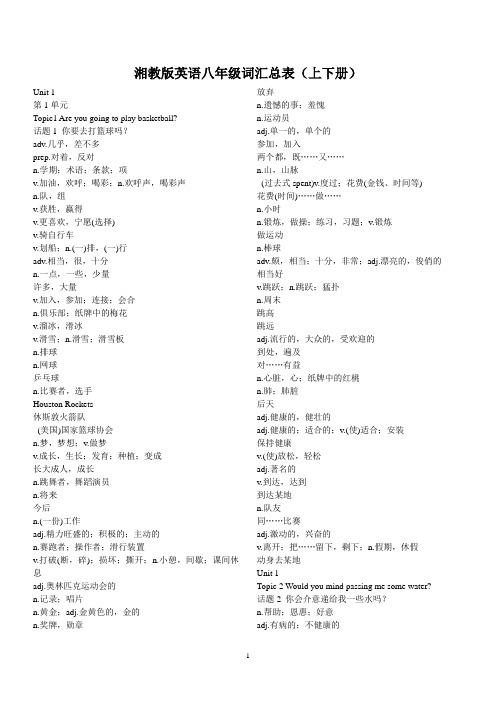
湘教版英语八年级词汇总表(上下册)Unit 1第1单元Topic1 Are you going to play basketball?话题1 你要去打篮球吗?adv.几乎,差不多prep.对着,反对n.学期;术语;条款;项v.加油,欢呼;喝彩;n.欢呼声,喝彩声n.队,组v.获胜,赢得v.更喜欢,宁愿(选择)v.骑自行车v.划船;n.(一)排,(一)行adv.相当,很,十分n.一点,一些,少量许多,大量v.加入,参加;连接;会合n.俱乐部;纸牌中的梅花v.溜冰,滑冰v.滑雪;n.滑雪;滑雪板n.排球n.网球乒乓球n.比赛者,选手Houston Rockets休斯敦火箭队(美国)国家篮球协会n.梦,梦想;v.做梦v.成长,生长;发育;种植;变成长大成人,成长n.跳舞者,舞蹈演员n.将来今后n.(一份)工作adj.精力旺盛的;积极的;主动的n.赛跑者;操作者;滑行装置v.打破(断,碎);损坏;撕开;n.小憩,间歇;课间休息adj.奥林匹克运动会的n.记录;唱片n.黄金;adj.金黄色的,金的n.奖牌,勋章放弃n.遗憾的事;羞愧n.运动员adj.单一的,单个的参加,加入两个都,既……又……n.山,山脉(过去式spent)v.度过;花费(金钱、时间等)花费(时间)……做……n.小时n.锻炼,做操;练习,习题;v.锻炼做运动n.棒球adv.颇,相当;十分,非常;adj.漂亮的,俊俏的相当好v.跳跃;n.跳跃;猛扑n.周末跳高跳远adj.流行的,大众的,受欢迎的到处,遍及对……有益n.心脏,心;纸牌中的红桃n.肺;肺脏后天adj.健康的,健壮的adj.健康的;适合的;v.(使)适合;安装保持健康v.(使)放松,轻松adj.著名的v.到达,达到到达某地n.队友同……比赛adj.激动的,兴奋的v.离开;把……留下,剩下;n.假期,休假动身去某地Unit 1Topic 2 Would you mind passing me some water? 话题2 你会介意递给我一些水吗?n.帮助;恩惠;好意adj.有病的;不健康的患病,病倒乐意于……v.介意;关心;n.思想,想法v.&n.练习,实践立刻,马上adv.在某处n.扔,投,掷Capital Stadium首都体育馆整理床铺adv.更;另外;adj.另外的;较多的(much或many的比较级)adv.安静地,寂静地v.设法对付;管理pron.我自己adj.粗心的,漫不经心的n.机会;可能性大声叫,喊n.进球;得分;(足球)球门;目标adv.(用于否定句或短语后)也;adj.两方任一方的;二者之一;con.j.二者之一;要么……v.争论;打仗(架),与……打仗(架);n.打仗(架),争论生(某人)的气尽(某人)最大努力pron.没有什么;没有一件东西继续做某事v.(给……)提供;端上;招待(顾客等),服务关小,调低adj.脏的n.分钟;一会儿,瞬间马上,立即adj.准备好的adv.清楚地,无疑地adj.再一;另一;别的;pron.另一个坐下,就座n.法国n.俄罗斯n.旅行adj.令人激动的,使人兴奋的adj.令人疲劳的,令人感到累的adv.&con.j.像……一样,如同;因为;prep.作为,当作也,还有n.比赛,竞赛v.发明,创造v.得分;进球;n.得分,分数n.世纪,百年adv.在室内;进入户内adv.在户外,在野外adj.加拿大人的;加拿大的;n.加拿大人n.学院,专科学校Springfield College斯普林菲尔德学院adj.室内的adv.甚至,连(……都);更prep.到……里;向内;变成n.边,旁边;面,侧面n.(篮球运动的)篮;篮子n.球场,运动场;法庭;法院v.遵守规则;跟随;仿效;跟得上v.成为;变得越来越(多的)adv.可是;con.j.然而,可是,尽管如此n.(pl.)炸土豆条(片),炸薯条n.巧克力adj.疲劳的,累的adv.容易地n.英里adj.新鲜的n.水果;果实adv.代替,顶替代替,而不是n.习惯,习性v.增强;建筑;建造使……更强壮,增强……体质;增进;增加;加强;扩大v.感觉,觉得;摸,触Unit 1第1单元Topic 3 Which sport will you take part in?话题3 你喜欢参加哪项运动?adj.外国的玩得高兴大量,许多为……准备好接力赛adv.可能,大概,也许交朋友adv.可能,或许adv.(口语)是;是的;好的v.采,摘;拾起,采集;挑选n.剧场,戏院n.木棒(棍),枝条;v.粘住,钉住;坚持v.&n.撞,打,击中n.祝贺,庆贺n.页,页码n.日记;日记簿n.获胜者adv.坏,恶劣地n.最后部分;结束;v.结束;做完v.鼓励adj.能够;有能力的能够n.共和国the People's Republic of China中华人民共和国(简称PRC)v.举办,主办;做主人招待;n.主人;节目主持人n.草;草场;牧草n.参观者,访问者v.改善,改进,更新n.环境pron.我们自己adj.现代的n.希腊n.箴言,格言n.环形物(如环,圈,戒指等);电话,铃声;v.打电话;(钟、铃等)响n.象征,标志代表,象征n.最少;最少量至少,不少于Unit 2第2单元Topic1 You'd better go to see a doctor.话题1 你最好去看看医生。

八年级上册英语湘教版知识点本文为您介绍八年级上册英语湘教版课程的知识点,包括语法、单词、短语和常用表达等方面。
希望通过本文的学习和练习,可以帮助您提高英语水平,更好地应对日常学习和考试。
一、语法1. 一般过去时:表示过去发生的动作或存在的状态,其构成为主语+动词过去式。
2. 现在进行时:表示现在正在进行的动作,其构成为主语+be动词(am/is/are)+动词-ing。
3. 一般现在时:表示经常性或习惯性的动作或状态,其构成为主语+动词原形。
4. 一般将来时:表示将来会发生的动作,其构成为主语+will+动词原形。
5. 情态动词:用于表示某种情况或推测,常用的情态动词有can、could、may、might、must、shall、should、will和would等。
二、单词1. 名词:表示人、物、地点、植物等,如book、desk、teacher、China等。
2. 动词:表示动作或状态,如go、play、read、draw等。
3. 形容词:表示人或事物的特征或品质,如big、small、nice、happy等。
4. 副词:表示程度、频率、时间或方式,如often、fast、well、soon等。
5. 代词:用来代替名词或其他代词,如he、she、it、they、this 等。
三、短语1. be used to:习惯于,适应于。
2. go to school:去上学。
3. at the beginning of:在……的开始。
4. be afraid of:害怕。
5. take photos:拍照。
四、常用表达1. How do you do?:你好。
2. What's your name?:你叫什么名字?3. How are you?:你好吗?4. I'm sorry.:对不起。
5. Thank you.:谢谢。
以上仅为部分知识点的介绍,希望通过学习和练习,能够更好地掌握八年级上册英语湘教版的知识点,提高英语水平。
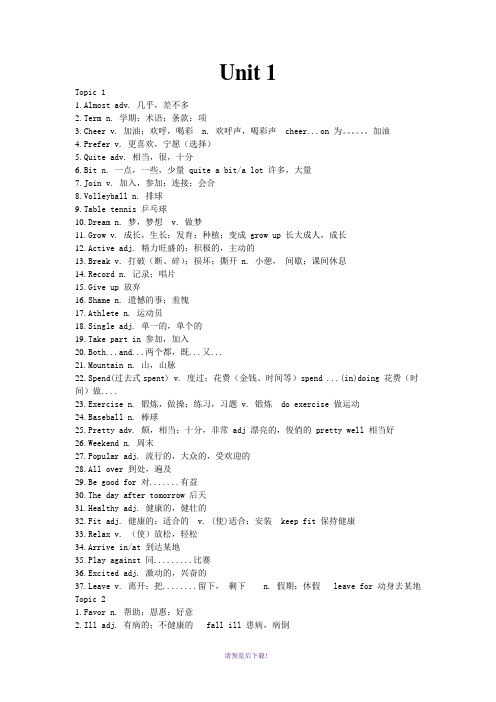
Unit 1Topic 11.Almost adv. 几乎,差不多2.Term n. 学期;术语;条款;项3.Cheer v. 加油;欢呼,喝彩 n. 欢呼声,喝彩声 cheer...on 为。
加油4.Prefer v. 更喜欢,宁愿(选择)5.Quite adv. 相当,很,十分6.Bit n. 一点,一些,少量 quite a bit/a lot 许多,大量7.Join v. 加入,参加;连接;会合8.Volleyball n. 排球9.Table tennis 乒乓球10.Dream n. 梦,梦想 v. 做梦11.Grow v. 成长,生长;发育;种植;变成 grow up 长大成人,成长12.Active adj. 精力旺盛的;积极的,主动的13.Break v. 打破(断、碎);损坏;撕开 n. 小憩,间歇;课间休息14.Record n. 记录;唱片15.Give up 放弃16.Shame n. 遗憾的事;羞愧17.Athlete n. 运动员18.Single adj. 单一的,单个的19.Take part in 参加,加入20.Both...and...两个都,既...又...21.Mountain n. 山,山脉22.Spend(过去式spent) v. 度过;花费(金钱、时间等)spend ...(in)doing 花费(时间)做....23.Exercise n. 锻炼,做操;练习,习题 v. 锻炼 do exercise 做运动24.Baseball n. 棒球25.Pretty adv. 颇,相当;十分,非常 adj 漂亮的,俊俏的 pretty well 相当好26.Weekend n. 周末27.Popular adj. 流行的,大众的,受欢迎的28.All over 到处,遍及29.Be good for 对.......有益30.The day after tomorrow 后天31.Healthy adj. 健康的,健壮的32.Fit adj. 健康的;适合的 v. (使)适合;安装 keep fit 保持健康33.Relax v. (使)放松,轻松34.Arrive in/at 到达某地35.Play against 同.........比赛36.Excited adj. 激动的,兴奋的37.Leave v. 离开;把........留下,剩下 n. 假期;休假 leave for 动身去某地Topic 21.Favor n. 帮助;恩惠;好意2.Ill adj. 有病的;不健康的 fall ill 患病,病倒3.Mind v. 介意;关心 n. 思想,想法4.Pratice v.& n. 练习,实践5.Somewhere adv. 在某处6.Throw v. 扔,投,掷7.Capital Stadium 首都体育馆8.Make one's bed 整理床铺9.Quietly adv. 安静地,寂静地10.Manage v. 设法对付;管理11.Myself pron. 我自己12.Careless adj. 粗心的,漫不经心的13.Chance n. 机会;可能性14.Shout at 大声叫,喊15.Either adv. (用于否定句或短语后)也16.Fight v. 争论;打仗(架),与。

2022-2023 学年湘教版八年级上册英语复习提纲Unit 1: Our World- Vocabulary:- Words related to the environment and nature- Words related to global issues and problems- Grammar:- Present simple tense- Expressions of purposeUnit 2: Seeing the Doctor- Vocabulary:- Words related to medical conditions and symptoms- Words related to visiting a doctor and medical treatment- Grammar:- Past simple tense- Modal verbs for obligation and suggestion- Indirect speechUnit 3: Life in the Future- Vocabulary:- Words related to future predictions and technologies - Words related to future jobs and careers- Grammar:- Future tenses- Conditional sentences- Passive voiceUnit 4: Hobbies and Interests- Vocabulary:- Words related to hobbies and interests- Words related to leisure activities and sports- Grammar:- Present continuous tense- Present perfect tense- Adverbs of frequencyUnit 5: Daily Routine- Vocabulary:- Words related to daily activities and routines- Words related to household chores and responsibilities - Grammar:- Present simple vs. present continuous tense- Present perfect vs. past simple tense- Reflexive pronounsUnit 6: Travel and Transportation- Vocabulary:- Words related to travel and transportation- Words related to planning a trip and making reservations - Grammar:- Future continuous tense- Prepositions of place and direction- Phrasal verbsUnit 7: Healthy Lifestyle- Vocabulary:- Words related to health and well-being- Words related to healthy habits and behaviors - Grammar:- Modal verbs for advice and prohibition- Gerunds and infinitivesUnit 8: Cultural Differences- Vocabulary:- Words related to cultural traditions and customs - Grammar:- Past continuous tense- Reported speech- Conditional sentencesUnit 9: Discovering Science- Vocabulary:- Words related to scientific discoveries and inventions - Words related to scientific experiments and research - Grammar:- Present perfect continuous tense- Passive voice with reporting verbs- Relative clausesUnit 10: Media and Entertainment- Vocabulary:- Words related to media and entertainment- Words related to types of media and popular culture - Grammar:- Past perfect tense- Modal verbs for speculation and deduction- Adjective clausesUnit 11: Festivals and Celebrations- Vocabulary:- Words related to festivals and celebrations- Words related to holiday traditions and customs- Grammar:- Past perfect continuous tense- Indirect questions- Subjunctive moodUnit 12: Global Issues- Vocabulary:- Words related to global issues and challenges- Words related to sustainable development and activism - Grammar:- Future perfect tense- Inversion for emphasis- Conditional clauses以上是2022-2023学年湘教版八年级上册英语复习提纲,涵盖了每个单元的词汇和语法内容。

Unit 1Topic 11.Almost adv. 几乎,差不多2.Term n. 学期;术语;条款;项3.Cheer v. 加油;欢呼,喝彩n. 欢呼声,喝彩声cheer...on 为。
加油4.Prefer v. 更喜欢,宁愿(选择)5.Quite adv. 相当,很,十分6.Bit n. 一点,一些,少量quite a bit/a lot 许多,大量7.Join v. 加入,参加;连接;会合8.V olleyball n. 排球9.Table tennis 乒乓球10.Dream n. 梦,梦想v. 做梦11.Grow v. 成长,生长;发育;种植;变成grow up 长大成人,成长12.Active adj. 精力旺盛的;积极的,主动的13.Break v. 打破(断、碎);损坏;撕开n. 小憩,间歇;课间休息14.Record n. 记录;唱片15.Give up 放弃16.Shame n. 遗憾的事;羞愧17.Athlete n. 运动员18.Single adj. 单一的,单个的19.Take part in 参加,加入20.Both...and...两个都,既...又...21.Mountain n. 山,山脉22.Spend(过去式spent) v. 度过;花费(金钱、时间等)spend ...(in)doing 花费(时间)做....23.Exercise n. 锻炼,做操;练习,习题v. 锻炼do exercise 做运动24.Baseball n. 棒球25.Pretty adv. 颇,相当;十分,非常adj 漂亮的,俊俏的pretty well 相当好26.Weekend n. 周末27.Popular adj. 流行的,大众的,受欢迎的28.All over 到处,遍及29.Be good for 对.......有益30.The day after tomorrow 后天31.Healthy adj. 健康的,健壮的32.Fit adj. 健康的;适合的v. (使)适合;安装keep fit 保持健康33.Relax v. (使)放松,轻松34.Arrive in/at 到达某地35.Play against 同.........比赛36.Excited adj. 激动的,兴奋的37.Leave v. 离开;把........留下,剩下n. 假期;休假leave for 动身去某地Topic 21.Favor n. 帮助;恩惠;好意2.Ill adj. 有病的;不健康的fall ill 患病,病倒3.Mind v. 介意;关心n. 思想,想法4.Pratice v.& n. 练习,实践5.Somewhere adv. 在某处6.Throw v. 扔,投,掷7.Capital Stadium 首都体育馆8.Make one's bed 整理床铺9.Quietly adv. 安静地,寂静地10.Manage v. 设法对付;管理11.Myself pron. 我自己12.Careless adj. 粗心的,漫不经心的13.Chance n. 机会;可能性14.Shout at 大声叫,喊15.Either adv. (用于否定句或短语后)也16.Fight v. 争论;打仗(架),与。

八年级上册英语知识点湘教本文旨在帮助八年级上册学习湘教英语的学生,提供一些常见的知识点和日常应用中的技巧。
以下是几个方面的重点:1. 语法篇英语语法一直是英语学习的难点,但只要掌握了基本的规则,就能更好地理解和运用。
1.1句型结构:英语语言中主语和谓语排在句子的开头,接着是宾语和其他修饰语。
即使是复杂的句子,也是由两个或多个简单句子组成的。
因此,理解句子结构是理解和写作的重要基础。
1.2时态和语态:英语中共有12个时态,常用的包括现在时、过去时、将来时等。
此外,还有被动语态和进行时态等。
正确使用时态和语态可以帮助自己表达明确、清晰。
1.3词性和句子成分:英语单词有多种不同的词性,如名词、动词、形容词等。
同时,句子中的词语也是不同的成分,例如主语、宾语等。
理解不同词性和成分的特点,可以更准确地运用。
2. 词汇篇英语词汇的学习需要坚持长期积累和实践,以下是一些日常学习中的小技巧:2.1背单词:背英语单词是学习词汇的基础。
可以利用背单词软件、单词书等多种方式进行背诵。
重点是要坚持每天背诵,持之以恒。
2.2看英文字幕:看英语电影或电视剧时,可以开启英文字幕,学习和熟识不熟悉的单词和短语,提高听力和阅读技能。
2.3运用单词:遇到不认识的单词时,可以在线翻译或查词典,同时积极运用新学单词,以加深印象。
可以尝试用新单词写简单的句子,串联成一个小故事。
3. 阅读篇英语阅读是英语学习的重要部分。
以下是一些阅读技巧:3.1了解背景:在阅读文章前,了解文章所处的背景和文化环境,可以更好地理解和解读。
3.2抓主旨:抓住文章的主旨或中心思想,可以更好地掌握文章的重点,同时可以避免在细节上花费过多时间。
3.3积累短语:阅读时,可以积累一些常用的短语,如“in conclusion”、“first of all”等,以便更加流畅和准确地表达。
4. 口语篇英语口语训练需要不断地练习和实践,以下是一些口语技巧:4.1多听多说:多听英语广播、电视、歌曲等,模仿语调和节奏,多说英语,练习口语能力和语音准确性。

八年级上册英语湘教版知识点总结一、重点词汇及注解1. communicate [kəˈmjuːnɪkeɪt]-注解:交流;沟通。
常指人与人之间通过语言、文字、手势等方式交换信息或表达想法。
-例句:We can communicate with each other by phone.(我们可以通过电话相互交流。
)2. improve [ɪmˈpruːv]-注解:提高;改善。
可以用于表示能力、成绩、生活质量等方面的提升。
-例句:You need to improve your English pronunciation.(你需要提高你的英语发音。
)3. nervous [ˈnɜːvəs]-注解:紧张的;焦虑的。
通常形容人在面对压力、考试、重要场合等时的情绪状态。
-例句:I feel very nervous when I speak in public.(当我在公众场合讲话时,我感到非常紧张。
)4. patient [ˈpeɪʃnt]-注解:有耐心的;能忍耐的。
用于形容人对待他人或事情时不急躁,能够耐心等待或处理。
-例句:The teacher is very patient with her students.(这位老师对她的学生非常有耐心。
)5. respect [rɪˈspekt]-注解:尊敬;尊重。
表示对他人的品质、地位、意见等的敬重。
-例句:We should respect our parents and teachers.(我们应该尊敬我们的父母和老师。
)6. expression [ɪkˈspreʃn]-注解:表情;表达方式。
可以指面部表情,也可以指语言、文字等用来表达情感或想法的方式。
-例句:Her expression showed that she was angry.(她的表情显示她生气了。
)7. achieve [əˈtʃiːv]-注解:实现;达到。
通常用于表示通过努力达成目标、取得成就等。

英语初二上仁爱湘教版全册知识点总结Unit1SportsandGamesTopic1Areyougoingtoplaybasketball?1.seesb.dosth“看见某人做了某事”强调动作的全过程,常与everyday;often等连用. seesb.doingsth.“看见某人正在做某事”强调动作正在进行.Eg:Isawyouplaybasketballalmosteverydayduringthesummerholidays. Ioftenseehimdrawpicturesneartheriver.我常看见她在河边画画. Isawhergoacrossthestreet.我看见她过了马路Isawhergoingacrossthestreet.我看见她正在过马路.[类似的有watch,hear,feel等这类感观动词.]2.joinsb.表示“加入某人的行列”“和某人在一起”join+组织表示“加入某个组织”takepartin表示“参加/出席某个活动”如:Willyoujoinus?Iwilljointheskiingclub.Sheisplanningtotakepartinthehighjump.3.preferto更喜爱〔to是介词,后接名词、V-ing形式〕Eg:Sheprefersfishtomeat.Sheprefersplayingthepianotoplayingtheguitar.4.arrivein+大地点arriveat+小地点getto+地点=reach+地点如:MyunclearrivedinBeijingyesterday.IarrivedattheGreatWall.=IgottotheGreatWall.=IreachedtheGreatWall.注意:reachhere/there/home=gethere/there/home=arrivehere/there/home5.leave…离开……leavefor…动身去…/离开到…如:TheyareleavingBeijingtomorrow.明天他们要离开北京. TheyareleavingforJapanthedayaftertomorrow.后天他们要前往日本.6.afew“几个;一些”修饰可数名词alittle“一点点”修饰不数名词如:Thereareafeweggsinthebasket.Thereisalittlewaterinthebottle.7.howlong表示“多久(时间)”;提问时间段.howoften表示“多常;多久一次”;提问时间的频率.如:TheywillstayinBeijingforaweek.→HowlongwilltheystayinBeijing? Heplaysbasketballtwiceaweek.→Howoftendoesheplaybasketball?8..begoodat(doing)sth.=dowellin(doing)sth.擅长于(做)某事如:Sheisgoodat(playing)baseball.=Shedoeswellin(playing)baseball.9..makesth/sb+adj.使某物(某人)在某种状态keep…sth/sb+adj.保持某物(某人)在某种状态如:Playingsoccercanmakeyourbodystrong. Swimmingcanhelptokeepyourheartandlungshealthy.重点语法一般今后时:〔一〕begoingto结构:①表示主语进行某一今后行动的打算、意图。
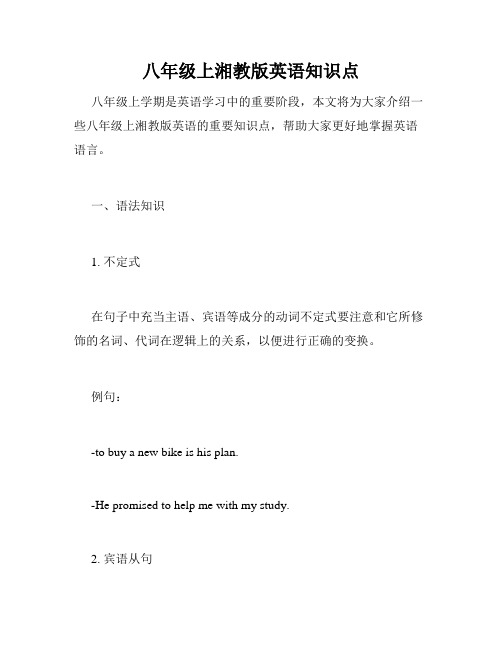
八年级上湘教版英语知识点八年级上学期是英语学习中的重要阶段,本文将为大家介绍一些八年级上湘教版英语的重要知识点,帮助大家更好地掌握英语语言。
一、语法知识1. 不定式在句子中充当主语、宾语等成分的动词不定式要注意和它所修饰的名词、代词在逻辑上的关系,以便进行正确的变换。
例句:-to buy a new bike is his plan.-He promised to help me with my study.2. 宾语从句宾语从句要注意时态的一致性、语序的正确性等方面。
例句:I think that he is a good student.3. 状语从句状语从句有条件、时间、原因、目的、让步等类型,要注意各类从句的语态、时态等。
例句:If you study hard, you will succeed.二、重要词汇1. Days of the week (星期几)Monday 星期一Tuesday 星期二Wednesday 星期三Thursday 星期四Friday 星期五Saturday 星期六Sunday 星期日2. Good habits (好习惯)brush teeth 刷牙wash face 洗脸get up 起床do homework 做作业go to bed 上床睡觉3. School subjects (学校科目)Chinese 中文Mathematics 数学English 英语Biology 生物Geography 地理History 历史4. Daily activities (日常活动)have breakfast 吃早饭have lunch 吃午饭have dinner 吃晚饭go home 回家watch TV 看电视play computer games 玩电脑游戏三、常用短语和句型1. 祝愿Happy birthday! 生日快乐!Good luck! 祝你好运!Merry Christmas! 圣诞快乐!2. 感谢Thank you very much. 非常感谢你。
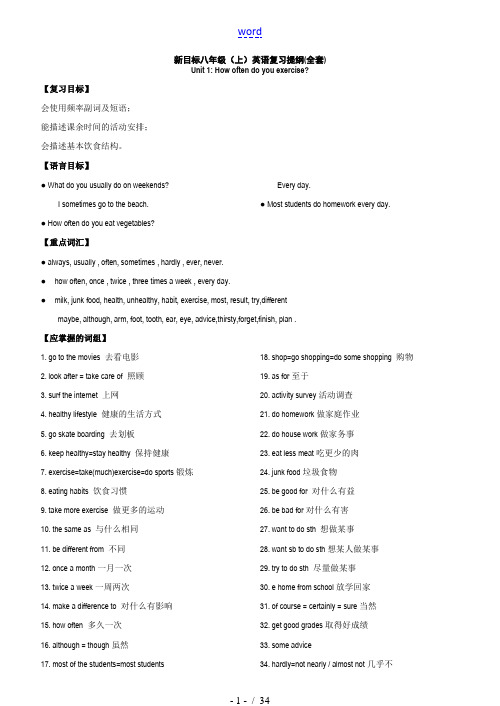
word新目标八年级(上)英语复习提纲(全套)Unit 1: How often do you exercise? 【复习目标】会使用频率副词及短语;能描述课余时间的活动安排;会描述基本饮食结构。
【语言目标】● What do you usually do on weekends?I sometimes go to the beach.● How often do you eat vegetables?Every day.● Most students do homework every day.【重点词汇】● always, usually , often, sometimes , hardly , ever, never.● how often, once , twice , three times a week , every day.● milk, junk food, health, unhealthy, habit, exercise, most, result, try,differentmaybe, although, arm, foot, tooth, ear, eye, advice,thirsty,forget,finish, plan . 【应掌握的词组】1. go to the movies 去看电影2. look after = take care of 照顾3. surf the internet 上网4. healthy lifestyle 健康的生活方式5. go skate boarding 去划板6. keep healthy=stay healthy 保持健康7. exercise=take(much)exercise=do sports锻炼8. eating habits 饮食习惯9. take more exercise 做更多的运动10. the same as 与什么相同11. be different from 不同12. once a month一月一次13. twice a week一周两次14. make a difference to 对什么有影响15. how often 多久一次16. although = though虽然17. most of the students=most students 18. shop=go shopping=do some shopping 购物19. as for至于20. activity survey活动调查21. do homework做家庭作业22. do house work做家务事23. eat less meat吃更少的肉24. junk food垃圾食物25. be good for 对什么有益26. be bad for对什么有害27. want to do sth 想做某事28. want sb to do sth想某人做某事29. try to do sth 尽量做某事30. e home from school放学回家31. of course = certainly = sure当然32. get good grades取得好成绩33. some advice34. hardly=not nearly / almost not几乎不35. keep/be in good health保持健康36.be stressed紧X的,有压力的37. take a vacation 去度假48.get back 回来【应掌握的句子】1. How often do you exercise? 你(你们)多久锻炼一次身体?How often + 助动词do(does或did) + 主语+ do sth.? 疑问词how often是问频率(多久一次),(在这里助动词do(does或did) 是起帮助构成疑问的作用)与一般现在时或一般过去时连用,回答一般是用表示频率的副词,如:once, twice, three times…, sometimes, often, quite, often, never, every day, once a week , twice a month , three times a month , three or four times a month 等。

八年级上册英语湘教版知识点总结英语是一门重要的课程,也是学生必须要掌握的一项技能。
为了帮助八年级学生更好地学习英语,本文将总结八年级上册英语湘教版中的知识点,提供有针对性的复习方案。
第一单元:Meeting New People本单元主要介绍了如何与新朋友相处,包括问候、自我介绍和交流爱好等。
在学习这些内容时,需要注意正确使用一些基本的句型,如“Hello, I’m…” 和“What’s your name?”第二单元:My School Life这个单元的重点是介绍学校生活,包括地点、时间和活动等方面。
在这个单元里,学生需要学会使用一些时间状语,例如“at seven o’clock” 和“in the afternoon”。
此外,还需要了解一些动词的时态,如现在时和过去时。
第三单元:My Friends本单元的重点是介绍朋友之间的相处之道,包括询问朋友的个人信息和喜好,以及谈论朋友之间的互动。
在学习这些内容时,需要学会正确使用一些疑问句型,如“What do you like to do?” 和“What’s your favorite food?”第四单元:My Country Is China这个单元主要介绍了中国的基本情况和文化。
在学习这些内容时,学生需要学会一些表示国家、地理位置、民族、文化特点等的词汇和短语。
此外,还需要了解一些有关中国文化的知识,如庆祝春节和端午节等。
第五单元:Our Hobbies本单元的重点是介绍兴趣爱好,并学习如何用英文描述它们。
在学习这些内容时,需要学会使用一些形容词和副词,例如“interesting”和“boring”。
还需要了解一些常用的动词短语,如“play basketball”和“listen to music”。
第六单元:Wonderful Animals这个单元介绍了不同种类的动物,并讲述了它们生活的方式。
在学习这些内容时,需要了解一些表示动物的词汇和短语,如“bird”和“fish”。

湘教版初二英语(八年级)上册期末知识点归纳第一部分单元短语与句型Unit 1I saw you play basketball almost every day.通常Hey, look! Can you see Michael dancing in the zoo? 正在进行Listen, someone is singing in the next room.正在进行Look, a car is driving towards us. 正在进行Would you like to come and cheer us on?=Do you want to come and cheer us on?I hope our team will win. win first place得第一名, win gold medals 获得金牌play it pretty well,pretty/very cold/small/big很,相当, play it more quietly/loudlydo well in = be good at+sth/doing sth擅长做某事(反义)do badly in,Do you row much(经常)? Yes, quite a bit./No, seldom.make one’s bed整理床铺,have a fight, keep tryingsay sorry to sb对某人说对不起,I am sorry to hear that. I am sorry about that.I am sorry for what I said.(原因)I am sorry for breaking you cup=I am sorry I broke your cup.Never mind=It doesn't matter.be angry with sb. Don’t be angry with me. She is angry with her mother. start to do sth/doing sth=begin to do sth/begin doing sth开始做某事He speak so loudly that we can hear him clearly.以至于He ran so fast that he won the game.throw/put sth into sth else把某东西放进另外的东西里面obey/follow the trafficrules—反义break the rulesFollow me 跟我来Can you follow me?=understandhave fun doing sth从做某事中得到乐趣make fun of sb取笑某人build me up/ build ourselves up=make me/us strongtry/do one’s best尽最大的努力,try to do sth试图做某事,manage to do sth设法做某事make friends with sb, during the sports meet 在校运会期间be ready for+n. I am ready for the exam.我准备好考试了。

(简化版)湖南版八年级上册英语期末复习知识点整理湖南版八年级上册英语期末复知识点整理Unit 1: Greetings and Introductions- Vocabulary: greetings, introductions, countries and nationalities - Grammar: basic verb forms, subject-verb agreement, possessive adjectivesUnit 2: School Life- Vocabulary: school subjects, school facilities, school activities- Grammar: present simple tense, adverbs of frequency, prepositions of time and placeUnit 3: Hobbies and Interests- Vocabulary: hobbies, activities, leisure time- Grammar: present continuous tense, expressing likes and dislikesUnit 4: Family and Friends- Vocabulary: family members, describing people, friendshipUnit 5: Travel and Holidays- Vocabulary: means of transportation, travel destinations, holiday activities- Grammar: past simple tense, regular and irregular verbsUnit 6: Health and Fitness- Vocabulary: body parts, health problems, healthy lifestyle- Grammar: imperative sentences, giving advice, expressing preferencesUnit 7: Food and Drinks- Vocabulary: food items, drinks, meals- Grammar: countable and uncountable nouns, expressing quantitiesUnit 8: Daily Routines- Vocabulary: daily activities, time expressions- Grammar: present perfect tense, simple past vs present perfect- Grammar: passive voice, reported speechUnit 10: Environment and Conservation- Vocabulary: environment, pollution, conservation efforts- Grammar: modal verbs, expressing obligations and possibilitiesUnit 11: Festivals and Traditions- Vocabulary: festivals and traditions, cultural differences- Grammar: conditional sentences, expressing hypothetical situationsUnit 12: Review- Vocabulary review: revisiting key vocabulary from previous units - Grammar review: practicing various grammar points from the course请根据以上内容进行整理,确保涵盖了湖南版八年级上册英语课程的所有知识点。
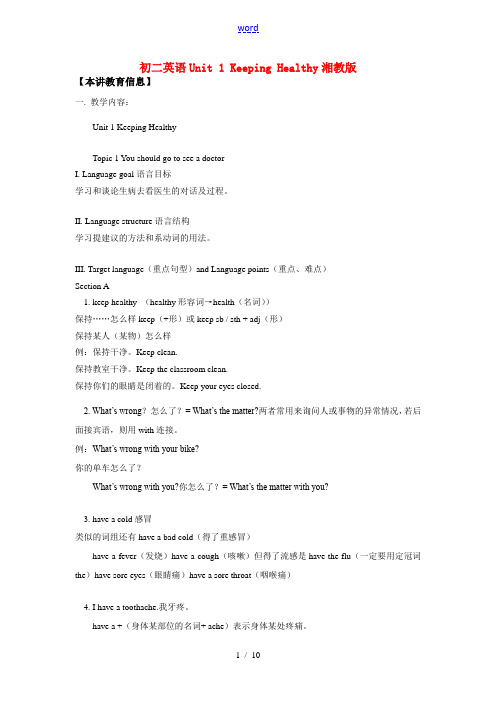
初二英语Unit 1 Keeping Healthy湘教版【本讲教育信息】一. 教学内容:Unit 1 Keeping HealthyTopic 1 You should go to see a doctorI. Language goal语言目标学习和谈论生病去看医生的对话及过程。
II. Language structure语言结构学习提建议的方法和系动词的用法。
III. Target language(重点句型)and Language points(重点、难点)Section A1. keep healthy (healthy形容词→health(名词))保持……怎么样keep(+形)或keep sb / sth + adj(形)保持某人(某物)怎么样例:保持干净。
Keep clean.保持教室干净。
Keep the classroom clean.保持你们的眼睛是闭着的。
Keep your eyes closed.2. What’s wrong?怎么了?= What’s the matter?两者常用来询问人或事物的异常情况,若后面接宾语,则用with连接。
例:What’s wrong with your bike?你的单车怎么了?What’s wrong with you?你怎么了?= What’s the matter with you?3. have a cold感冒类似的词组还有have a bad cold(得了重感冒)have a fever(发烧)have a cough(咳嗽)但得了流感是have the flu(一定要用定冠词the)have sore eyes(眼睛痛)have a sore throat(咽喉痛)4. I have a toothache.我牙疼。
have a +(身体某部位的名词+ ache)表示身体某处疼痛。
如:have a stomachache(胃疼)have a backache(背疼)have a headache(头疼)5. You should see a dentist.你应该看看牙医。
新人教版八年级上册英语单元语法及知识点归纳Unit1 Where did you go on vacation?【重点语法】不定代词:不指名代替任何特定名词或形容词的代词叫做不定代词。
用法注意:1. some 和 any + 可数名 / 不可数名。
some 多用于肯定句, any 多用于否定句、疑问句和条件从句。
有些问句中用 some, 不用any, 问话者希望得到对方肯定回答。
2. 由 some, any, no, every 与 body, one, thing 构成的复合不定代词作主语时,其谓语动词用三单。
3. 不定代词若有定语修饰,该定语要置于其后:如: something interesting【重点短语】1. buy sth for ab./ buy sb. sth 为某人买某物2. taste + adj. 尝起来……3. nothing...but + V.( 原形 ) 除了…… 之外什么都没有4. seem + (to be) + adj 看起来5. arrive in + 大地方 / arrive at + 小地方到达某地6. decide to do sth. 决定做某事7. try doing sth. 尝试做某事 / try to do sth. 尽力做某事8. enjoy doing sth. 喜欢做某事9. want to do sth. 想去做某事10. start doing sth. 开始做某事 =begin doing sth.11. stop doing sth. 停止做某事区分: stop to do sth. 停下来去做某事12. dislike doing sth. 不喜欢做某事14. so + adj + that + 从句如此…… 以至于……16. tell sb. (not) to do sth. 告诉某人(不要)做某事17. keep doing sth. 继续做某事18. forget to do sth. 忘记去做某事 / forget doing sth 忘记做过某事【词语辨析】1. take a photo/ take photos 拍照quite a few+ 名词复数“ 许多…”2. seem + 形容词看起来…... You seem happy today.seem + to do sth. 似乎 / 好像做某事 I seem to have a coldIt seems + 从句似乎..…. It seems that no one believe you.seem like ... 好像,似乎….. It seems like a good idea.3. arrive in + 大地点 = get to= reach+ 地点名“ 到达......”arrive at + 小地点(注:若后跟地点副词 here/there/home, 介词需省略,如: arrive here; get home )4. feel like sth 感觉像…feel doing sth. 想要做某事5. wonder (想知道) + 疑问词( who, what, why) 引导的从句。
6. because of + 名 / 代 /V-ingbecause+ 从句He can’t take a walk because of the rain.I don’t buy the shirt because it was too expensive.7. enough + 名词足够的…...形容词 / 副词 +enoughUnit2 How often do you exercise?【重点语法】1. 频率副词 : always, usually, often, sometimes, never频率副词在句中通常放在实义动词之前 , be 动词或助动词之后。
常用于一般现在时态中。
2.“ 次数” 的表达方法一次 once ,两次 twice ,三次或三次以上:基数词 + times, 如: three times, five times, 3. how often“ 多久一次” 问频率,回答常含有频率词组或短语。
常见的 how 疑问词:1 ) How soon 多久(以后)—How soon will he be back? 他多久能回来?—He will be back in a month. 他一个月后能回来。
2 )how long “ 多久”—How long did it take you to clean the house? 你打扫房子用了多久?—It took me half an hour to clean the house. 我打扫这房子用了半小时。
3 ) How many+ 名复How much+ 不可名“ 多少” 问数量( how much 还可问价格)【重点短语】1. go to the movies 去看电影2. look after = take care of 照顾3. surf the internet 上网4. healthy lifestyle 健康的生活方式5. go skate boarding 去划板6. keep healthy=stay healthy 保持健康7. eating habits 饮食习惯8. take more exercise 做更多的运动9. the same as 与什么相同10. be different from 不同11. once a month 一月一次12. twice a week 一周两次13.make a difference to 对 ...... 有影响 / 作用14. most of the students=most students15. shop=go shopping=do some shopping 购物16. be good for 对 ...... 有益17. be bad for 对 ...... 有害18. come home from school 放学回家19. of course = certainly = sure 当然20. get good grades 取得好成绩21. keep/be in good health 保持健康22. take a vacation 去度假【词语辨析】1. maybe / may bemaybe 是副词,意为“ 大概,可能,或许” ,一般用于句首。
May be 是情态动词,意为“ 可能是 ... ,也许是 ... ,大概是...”.The baby is crying. Maybe she is hungry.The woman may be a teacher.2. a few / few / a little / littlePeople can live to 100, but few people can live to 150.There is little time left. I won’t catch the first bus.Could you give me a little milk?3. hard / hardlyhard 作形容词,意为“ 困难的,艰苦的,硬的” ;作副词,意为“ 努力地,猛烈地” 。
hardly 为副词,意为“ 几乎不” 。
The ground is too hard to dig.I can hardly understand them.It’s raining hard. The people can hardly go outside.4. As for homework , most students do homework every day .as for... 意思是“ 至于;关于” , + 名词、代词或动词的 -ing 形式(即动名词)。
如: As for him , I never want to see him here.至于他,我永远不希望在这里见到。
As for the story , you'd better not believe it.关于那故事,你最好不要相信。
5. That sounds interesting.这是“ 主语 + 系动词 + 表语” 结构的简单句。
sound (听起来), look (看起来), smell (闻起来), taste (尝起来), feel (觉得), seem (好象), grow (变得) ,get (变得)等词在英语中可用作系动词,后跟形容词作表语。
如:It tastes good. 这味道好。
The music sounds very sweet. 这音乐听起来很入耳。
The smoke grew heavier and heavier. 烟雾变得越来越浓了。
6. percent 名词,意为“ 百分之……”百分数的表示方法:基数 + percent ( 不用复数形式 ) , percent 做主语时,谓语动词的数要根据其后面的名词来确定。
50 %: fifty percent 百分之五十Fifty percent of the apples are bad. 50% 的苹果都坏了。
Twenty percent of the meat is in the fridge. 20% 的肉都在冰箱7. not… at all 意为“ 一点也不” , not 应放在 be 动词、情态动词或助动词之后。
The story isn’t interesting at all. 那个故事一点也没有趣。
8. It is + adj. to do sth. 做某事是…… 的。
It is interesting to play computer games. 玩电脑很有趣。
9. take, spend, payIt takes sb. some time to do sth. 意为“ 花费某人…… 时间来做某事” 。
人 (sb.) spend 时间 / 钱 on sth. “ 买某物花了…… 钱” 。
人 (sb.) spend 时间 / 钱(in) doing“ 花费多少时间来做某事” 。
pay 的主语必须是人,而“ 花钱买某物” 为 pay...for...10. however 副词,意为“ 然而,可是” ,表示转折关系,可放在句首、句中、句末。
Unit3 I’m more outgoing than my sister.【重点语法】1. 形容词和副词的比较等级( 1 )形容词和副词的原形就是原级( 2 )比较级,表示较…… 或更……( 3 )最高级,表示最 ... 。